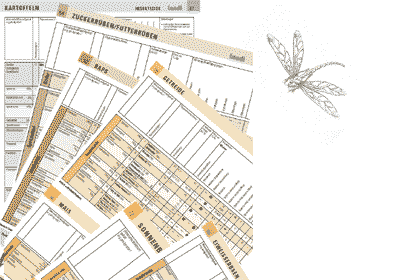Bees- a toxic overkill
In China, workers pollinate fruit trees by hand.
In California, almond monocultures are fertilized with mobile express beekeepers.
What’s next? Autonomous robot bees?
Because organic production or a ban on insecticides is too expensive?
The agony of choice
The pesticide-industries present in their subtle rainbow colours catalogues a never ending choice of pesticides. Such as the insecticides for the wheat.
Quiz question: Why does wheat need insecticides? Who has ever seen insects attacking wheat-fields?
In fact, aphids can infest over-fertilized wheat. But (European) farmers who over-fertilize lose their subsidies.
Corn is also very rarely infested, only in corn monocultures, but they are also banned, precisely because they are so susceptible.
But some bugs eat canola flowers? If so, the plants just make new ones.
Best practice instead of pesticides
Problems in agriculture? Put the blame on mother nature!?
With good professional practice, arable crops are hardly damaged by insects.
In fact, there is no (scientific-statistical) correlation between infestation and yield of a field: Even record yields may well have suffered severe pest attacks, while many poor crops have never been infested; an ideal variety and nutrient supply is more crucial for the yield.
That’s why the industrial brochures just praise the effects of the insecticides on the insects, but not on the yields.
The imaginary invasions
Insecticides fight losses in the field that would be prevented if the subsidies conditions were respected.
We sacrifice bees because we need to prevent insects from damaging our crops? Food destruction by insects is not measured in real terms, but estimated, usually using intercontinental projections. It makes no sense to invest in damage control without knowing the real extent of the threat. In southern Europe, fire departments are well equipped against forest fires; in humid regions, they do not even exist.
Collateral damage must not be worse than the damage it is intended to prevent.
Evil nature?
Who fears nature, has no green thumbs. But problems.
In arable farming, damage is almost always the result of a bad professional practice.
In organic farming, potatoes are the only arable crop that suffers real, but modest losses. Potatoes are susceptible to disease in the cold, wet autumn; because in their native Andes, it rains more in summer.
Such “taxes” to nature are bearable; they are far lower than those to the state.
This exceptional case, together with the damage in vineyards and orchards, served for alarmist scare tactics against a hostile, dangerous nature.
The lobbyists even conjure up the devastating plagues of locusts, even if they only come when we heat up the climate even more.
The self-control of toxins
About 20 years ago, when organic, eco and healthy became trendy, politicians in Europe ordered an eco-agricultural transition: Pesticides can only be used if the financial loss caused by a pest is higher than the cost of the pesticide application. Farmers receive subsidies only if they comply with theses damage thresholds.
In road traffic, the authorities control randomly the respect of the speed limits. But as for the poisons in the food production, they rely on self-regulation and abstain from any controls.
Even though every second person will get cancer.
The governmental eco-sabotage
Not helping endangered people is a punishable offense in road traffic, deliberately endangering them even more.
Since the “ecological transition”, pesticide contamination and civilization diseases are continuously rising.
The agrarian ministries undermine and sabotage deliberately their ecological threshold regulation: They saved a few sips of the oh-so-cheap and healthy milk in the forbidden fodder maize monocultures with the preventive neonicotinoid seed treatments.
And sacrificed the bees for it.
Since this could be forbidden, they save some of the oh so cheap and healthy chips with neonicotinoids for canola and potatoes. The canola has even to be treated before flowering so that it does not have the opportunity to outsmart its predators by its own and for free.
Now there is an innovative generation of even more toxic insecticides, which are allowed to kill the bees until in a few years the scientific proof is given that the damage is enormous, the benefit minimal etc.,
Bees are dying because of the toxic overkill of a poor agricultural practice and policy.
Our agricultural ministries are unilaterally committed to saving an endangered pesticide industry.
They sacrifice the bees for it.
And the people.

The pretty-harmless catalogue for selling… bees killers.
And fatal poisonings in all families .
Impossible!? Along with the herbicides, fungicides, and other poisons that are just as “essential” for our survival.
Science and insecticides
Our agricultural ministries suggest massive crop losses and protective poison solutions.
But they don’t measure the real crop losses. Nor the success of the pesticide applications.
Because without scientific measurements, no one can complain, that the pesticide applications are all too often, or almost always, senseless.
